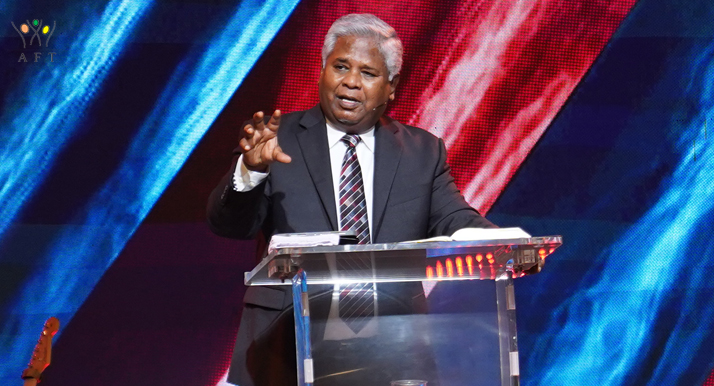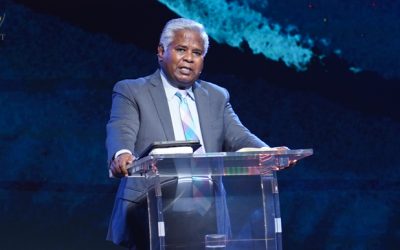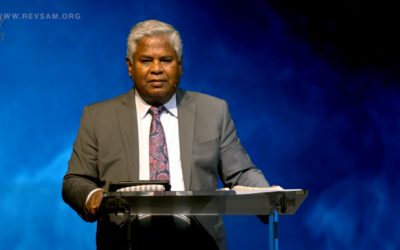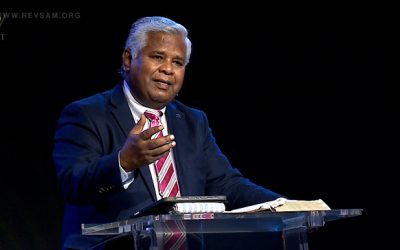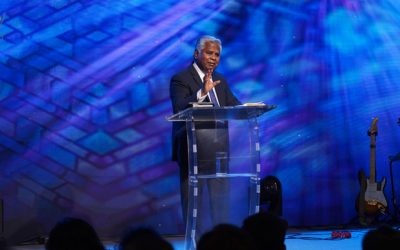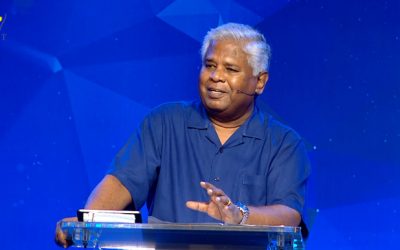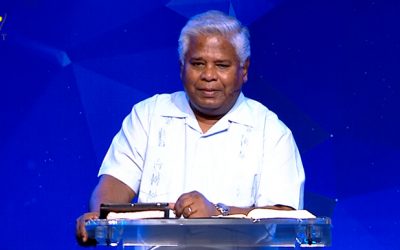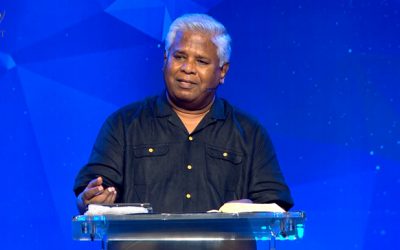
How Grace Changes Us? (Part 10): Truth
Sunday English Service – 30 JAN 22
Transcript
Please turn with me to 1 Corinthians chapter 13, please. 1 Corinthians chapter 13. Remember we have been teaching on “Abounding grace” and the term “abounding grace” comes from Romans chapter 5, verse 20, where Paul says, “Where sin abounded, grace did much more abound.” What does he mean? Sin comes in, it abounds, it means it exercises a lot of power over people. It’s powerful. Sin is powerful. It destroys people, ruins people, tears up people’s lives, destroys and ruins it. But when God’s grace comes to us, through salvation, the grace of God is even more powerful than sin, so that it remedies everything that sin has done. But not only that, it makes everything much more beautiful, and wonderful than it ever was. So, this whole teaching is about how grace comes into our lives and how it changes us. That’s what we’ve been teaching.
Now, in this, we came to 1 Corinthians 13, if you remember. And we’ve been doing some teaching from 1 Corinthians 13. It’s a famous chapter on love. But there are some wonderful truths here. I don’t know if you looked at it that way. In 1 Corinthians 13, verse 3, I believe, is the gateway to the truth that we have, in that chapter, The Great Love chapter. Verse 3 says, “Though, I bestow all my goods to feed the poor, and though I give my body to be burned, but have not love, it profits me nothing”, says Paul. Now, what he means is this. He means that a person may do such good works, extraordinarily good works, as bestowing all his goods to feed the poor, and even give his body to be burned for some good cause, if necessary. A person can do such extraordinarily good works, without any love in his heart. That’s what he means. He says, “If I do all these things, and if I don’t have love, it doesn’t profit me in any way.” That means a person is able to do such good works without any love in his heart, without any change in his heart, without God ever touching his heart and changing his heart by His work of grace. Without God ever taking a hold of man’s heart and changing it, a man is able to do such extraordinarily good works; it’s unbelievable.
You may say, “How can a person do that? How can a person do such good works without God changing his heart?” See, even central men have various motives working for them. Some of them do it because they want to get a name and the fame. Some of them do it because they want to look good in front of others. Some of them do good because they feel like they’ve done enough damage and they need to work up some good works to make up for all the evil works that they have done, so, they try to pay the penalty for all the evil works by doing some good works. Now, they have so many motives like this. We don’t know who has which motive; we are not going into personal motives. But people do have selfish motives. People do things many times for their own benefit, for their own profit. Even when they do good, that evil motive is there. That’s what sin has done with people. So, a man may give everything that he has to feed the poor, may give his body to be burned for a good cause but still have not love, still have not the nature of God, still have not been changed in the heart.
Now, after saying that. Paul goes on immediately in verse 4, and goes on until verse 8, talking about what a changed heart is all about. What are the traits and characteristics, marks of a changed heart, a heart that has been changed by the power of God, by the grace of God? Look at how he says, “Love”. He begins it with love because a changed heart—the mark of a changed heart if you want to say it in one word—is love. God is love, so when God changes people’s hearts, He makes it a heart of love. Love is the mark of a changed heart. And then, he describes what love is all about, what the marks are of a person who has a heart of love. It says, “Love suffers long and is kind; love does not envy; love does not parade itself, is not puffed up; does not behave rudely, does not seek its own, is not provoked, thinks no evil; does not rejoice in iniquity, but rejoices in the truth; bears all things, believes all things, hopes all things, endures all things. Love never fails”, he says. These are the characteristics, the marks, the traits of a heart that has been changed by the power of God, by the power of the Holy Spirit.
Now, we have been looking at various traits. We looked at several of these. We looked at long suffering; talked about forgiveness, as the issue there; we looked at kindness, and so on. The list of traits and characteristics of a changed heart is available in various places. It’s available here, it’s available Galatians, 5, where the list is given of the fruit of the Spirit. Then, it’s available in Colossians chapter 3, Ephesians chapter 4, various places, similar lists appear. So, we’re trying to go into some of these traits and characteristics, so that we can see the difference between a morally restrained heart – the heart, which does good things, because of some moral restraint but it’s not changed by the power of God. The natural man, still in his sin, still, his heart is not changed, never been touched. We call that a morally restrained heart; he’s able to do good works. We want to see the difference between that kind of a heart and a supernaturally changed heart, which is what verses 4 to 8 is all about.
Today, we want to look at one particular trait that is found in verse 6. It says, “Love does not rejoice in iniquity, but rejoices in the truth”. I want to talk about this particular trait; I want to talk about only half of it, really. We don’t have the time to talk about all of it. It says, “It does not rejoice in iniquity, but rejoices in truth”. Now, “does not rejoice in iniquity”, is a separate subject. We have to deal with it separately. But I want to talk about how “it rejoices in the truth”. Have you really understood what it means to rejoice in the truth? Now, some people think that it’s talking about being truthful, being faithful, being honest, and so on. All that is included in it. But I believe it’s talking about something more, “rejoicing in the truth” is something more. And we want to look at that today.
Now, I say, “Rejoicing in the truth”, is something more because a natural heart of a man whose nature is as he’s born. You know, he’s a sinful being, born in this world as Adam’s son. A natural heart is a heart that does not rejoice in truth. I don’t know if you realize that or not. Heart is very evil. You know, when sin came in, it affected the heart of people. So, the heart is a terrible thing to deal with. You cannot deal with the heart of things. If you can change somebody’s heart, you can change the whole person. That’s why, when sin came, it changed the heart so that fundamentally, everything is changed. So, out of that flows a life, an evil life. When God comes in with His grace, He also deals with the heart and changes the heart so that fundamentally, things are changed. At the root, things have changed, so that a life flows out of that. So, a natural heart of a man who’s not converted, a man who has not been born-again, a man who has not been touched by the power of the Holy Spirit. That heart is a heart that does not rejoice in truth. This “rejoicing in truth” is not possible for that heart at all. Now, let me just give you one example; we have many examples, let me just give you one example. One example is, have you ever tries to talk to people to tell them how they are wrong about a particular thing? That will be the truth, that they are wrong, that they are wrong is there in the Word of God, and you want to tell them that they’re wrong, you will find the people whose heart has not been touched by the power of the Holy Spirit will not accept the fact that they’re wrong. They’ll find it very difficult to accept the fact that they’re wrong. How many times have you seen people—husbands or wives or children are whoever it is—when they’re wrong, if you tell them, they will not accept it. They will not accept you telling them that they are wrong. They’re always interested in putting the blame on someone else, calling other people wrong, but they will not accept the fact that they are wrong.
Now, I’ve seen that in many places, where there are marital problems, and problems in marriage, and so on. Nobody likes to admit that they’re wrong. Everybody’s pointing to the other and say they’re wrong. They’ll never admit that they’re wrong. And even if they admit it, they will superficially admit that they’re wrong, just to be admitting, just to be obliging, but not really admitting that they’re wrong. That’s the problem. Many times, I’ve found that people are afraid to even tell them that they’re wrong. Some husbands are afraid to tell the wife that she’s wrong. And wives are afraid to tell the husband they’re wrong. The pastor is afraid to tell both of them that they’re wrong because they can’t accept it. I’ve seen it, practically; they will not. Who’s there to tell them? Nobody can tell them, even God cannot tell them. And that is why sometimes they may go to church; they may go and be religious about everything and be pretty decent people also. But they will not experience this life that God’s grace and bring for them, this wonderful life that God has intended for them, a life of absolute bliss and happiness and joy and peace on a level that they have never known in their life. They cannot go into that at all. They will live a mediocre life; they will have some kind of peace and so on. It’s like ceasefire, you know. When they have ceasefire, that’s not peace, they’ve just decided not to fight for a few days. That’s what ceasefire is all about. So, that kind of peace, they enjoy a temporary peace where they’re counting the days and hours and so on, but not really enjoy the peace that God’s grace can bring about, with a heart that is changed. But a heart that is changed is different. The heart that has changed is the wonderful heart because it can provide you with a beautiful, wonderful future. A heart that is changed is ready to admit. In fact, it rejoices in the truth. That’s what I want to show you today. It rejoices in the fact that God’s Word and God is pointing out to some things that is wrong in them. It rejoices in the fact that truth is now made known. It’s happy to discover the truth, that they have been wrong. And therefore, such a person is going to have a very bright future because if he goes on like that, if he keeps rejoicing in the truth in that way—just giving you one example—if he keeps rejoicing in the truth in that way, that he admits that he is wrong or she is wrong. Truly admit, and truly, humbly admit that they’re wrong and yield to God and His Word, they’re going to be able to change everything about them. Everything that has gone wrong, can be changed. Everything that is missing can be brought back. Everything that has been ruined, can be made beautiful and wonderful.
Just think about that: rejoicing in the truth. Do we rejoice in the truth? When the truth says, when the truth is that we are wrong. Rejoicing in the truth is much more than just not sinning, just being honest, just being technically honest, ethically honest, and so on. It goes far beyond that. It is much more than that. Rejoicing in the truth is a heart that has been so powerfully changed by God’s grace by God’s Holy Spirit, which is embraces truth, it rejoices in the truth, is ready to accept the truth, ready to accommodate the truth, and be changed powerfully by the truth and that heart will take a person a long way. That heart will take a person into a life of absolute bliss and happiness, that only God’s grace can bring in the person’s life.
So, in this connection, I want to read to you Ephesians chapter 4. And we’ve always been reading from 1 Corinthians 13, and picking out one trait, and then, going to a longer passage, where this trait is spoken about in another passage. So, let’s go to Ephesians chapter 4; let me read to you from verse 15, all the way to verse 25, then quickly, teach on that. But, speaking the truth in love, may grow up in all things into Him – see, it’s talking about speaking the truth in love. So, it’s talking about the same matter of truth and what our attitude to truth is, and how we handle the truth. That’s what it’s talking about. Speaking the truth in love, may grow up in all things into Him who is the head—Christ—from whom the whole body, joined and knit together by what every joint supplies, according to the effective working by which every part does its share, causes growth of the body for the edifying of itself in love. This I say, therefore, and testify in the Lord, that you should no longer walk as the rest of the Gentiles walk, in the futility of their mind, having their understanding darkened, being alienated from the life of God, because of the ignorance that is in them, because of the blindness of their heart; who, being past feeling, have given themselves over to lewdness, to work all uncleanness with greediness.
But you have not so learned Christ, if indeed you have heard Him and have been taught by Him, as the truth is in Jesus: that you put off, concerning your former conduct, the old man which grows corrupt according to the deceitful lusts, and be renewed in the spirit of your mind, and that you put on the new man which was created according to God, in true righteousness and holiness. Therefore, putting away lying, “Let each one of you speak truth with his neighbour,” for we are members of one another.
Now, using this passage, let’s explain the truth about how a changed heart rejoices in the truth. Now, this passage, I believe, points us to three things. The first thing is the problem of truth. Now, there is a problem of truth these days because we live in a very modern world, so attitudes have changed. That is a problem of truth. We’ll talk about that. So, the first thing we this passage points to is the problem of truth. Secondly, it points to the fact that every one of us must have an encounter with truth. Encounter is something where a person’s destiny is changed by meeting with the truth in an amazing way. Then, thirdly, the practice of truth. How do we practice truth? How do we bring truth into our practical life? Let’s quickly go over it. The problem of truth. What is the problem concerning truth, these days? We live in a modern world we think, but the world will tell you that we are not in the modern world. Modern is too old. We are in what is called the ‘postmodern world’, but even postmodern world has come to an end they say. We are at the end, the tail end of what is called the ‘postmodern world’. One of the characteristics of the post modernism, as they call it, is that there are no absolutes. They began talking about going back to the ‘70s, when I was a college student, back in ‘80s itself. Now, we are at the tail end of it; that is becoming old now. But the remains of that idea are still influencing a lot of people and a lot of people are catching on to this idea, here in India, very much nowadays. They say there are no absolutes, therefore, you cannot claim to have truth. Nobody can claim to have truth, a universal truth. There is no such thing as universal truth. There is no such thing as truth that applies to everyone here. That’s what they’re saying. So, if you just imagine how difficult it will become, it becomes to open the Bible and speak to those people. As soon as they open the Bible, they say, “Hey, come on, stop it.” That’s their attitude. “Come on, stop it. Don’t open the Bible and talk to me. I don’t believe in the Bible. Bible is good for you, not for me. Don’t open the Bible to me. I don’t believe in the Bible. I don’t want the Bible. I don’t accept the Bible as having any kind of authority. The Bible cannot tell me what is right and what is wrong. There is no universal moral truth. You cannot tell me the 10 Commandments; you cannot tell me all of these things. No.” This is their attitude. There are no absolutes. There are no truths that applies to everybody. It’s a truthless world. One thing may be truth to you; another thing, may be truth to another person. So, you cannot talk about truth, as something that applies to everyone.
You know, just think what kind of confusion it will cause. That’s why we have a world like we have today. It’s post modernism, they call it. Their main thing is an attack on the truth, on the truth of God’s Word, anything like Bible, and any claim to truth is attacked. So, it becomes very difficult to even stand up and preach in a society like that, because they’re influenced by this idea. But the traditional view of truth is still there. The traditional idea of truth is that truth is a goal and a guide. See, when you leave the house in the morning, you need to know where you’re going. You don’t leave the house just simply to leave. You have a place that you’re going to. Any person that has left his house and comes out, knows where he’s going. So, he’s headed in a different direction. Truth is like that, they say. Those who believe that there is such a thing as universal truth, they say that truth sets a goal. That’s the way we need to be. That’s the way we need to be. That’s what we need to be. The goal. We may not be that yet, but we are looking to that goal and we are proceeding towards that goal. And it is a guide, they say and this truth, which is the goal and the guide cannot be dispensed with, they say. And all those sceptics, who do not believe in the idea of absolute truth, who believe that there is nobody that can have a claim to truth. They only pretend to do without it. These people, they point out to them, the postmodernists and say, “Look at them. They say they don’t believe there is any truth.” But those people saying that there is no truth. There is no absolute truth. They are claiming an absolute truth. Their absolute truth is, there is no truth. They say there is no truth and that is a truth claim they’re making. They’re saying you better get on our side, you better become like us. Otherwise, we will not accept you otherwise, you’re too old. Otherwise, you’re too old fashioned. Otherwise, you’re not modern enough. You better get on our side and believe that there is no universal truth. See, now they’re making claim to a truth. They’re saying that nobody can make a claim to a truth, universal truth, but they are making a claim to a truth. They believe that everybody should believe that there is no truth. There is no absolute truth. That’s the problem.
So, these people believe the truth is the problem. It is because some people are making claim to truth. That is why we have all these wars and fighting, between one religion to another and one kind of belief to another. We are hating one another, fighting and there is so much violence going on, so much confusion going on in this world because some people make a claim to truth and there’s a lot of people making different claims to truth. Somebody says, “My thing is the right thing. My belief system is the right one.” And another person says, “No, mine. My belief system is the right one.” So, there is a lot of tension going on like that, they say. “Truth is the problem”, they say. But really, the problem is not the truth and Paul is pointing to that here. The problem is not the truth; the problem is the way truth is handled. The problem is the way people take the truth and deal with the truth. The problem is the attitude towards the truth. Problem is the way that people relate to the truth. I’ll show you what the problem is. The problem is not the concept of truth. The problem is how people take truth, and what they do with it. What they do with it? Usually, when somebody makes a truth claim, they believe that that’s the truth. Therefore, they try to overpower everybody with the truth. They say, “How come you don’t know about this? This is the truth; you better believe all this truth.” And they try to control the truth. They believe that that truth belongs to them, and they own it, they have power over it, and they can now deploy it, whichever way they want to. They use it in that way. So, there is an immediate and automatic connection between truth and power. So, those who have truth, who believe that there is truth, they believe in a particular truth, they try to exercise power and authority over others. And that’s how they deal with truth. This is the way they relate to truth. This is the way they deal with the truth. There is an automatic immediate connection between truth and power. As soon as a person realizes he has come to know some truth, he tries to exercise power over others. And Paul sees that problem. That is what he’s addressing here, in Ephesians, chapter 4, starting from verse 15. But if you read it from verse 14, it’s very clear. Actually, if you read from verse 13, it’s better.
The whole passage starts from verse 11, actually. What he’s talking about is how the risen Christ has given the gifts to the church, the gifts of various ministries, apostles, prophets, evangelists, pastors and teachers; five different gifts are given to the church. And then, he talks about why he has given the five gifts. Why has he given the church the five gifts? It’s for the equipping of the saints, for the work of the ministry, for the edifying of the Body of Christ, so the Body of Christ can be built up. Verse 14 says, “That we should no longer be children, tossed to and fro and carried about with every wind of doctrine, by the trickery of men, in the cunning craftiness of deceitful plotting.” What he’s saying is, “Well, there’s a lot of people going around teaching all kinds of wrong things. People are carried about with every wind of doctrine, by the trickery of men.”
As a Christian preacher, even back in those days, he’s experiencing this. There are people go around, teaching all kinds of doctrine, tricking people, so that people are kept like little children. See, little children are always dependent upon adults. They cannot exist on their own. They always need the father or mother to be with them. But if the 25-year-old boy or girl, wants his father or mother always, there’s a problem. And in the church, he says, they have produced that kind of problem, because there are people that are going around, their kind of teaching is this: when they teach, people become dependent upon them. People become like children; they become totally dependent upon them. And not only that, but they’re also easily swayed by various teaching, tossed to and fro, carried about with every wind of doctrine. Only children will be carried about with every wind of doctrine because children believe everything. He says that kind of problem is going on and that is why he says we need a different kind of approach. And so, he begins with verse 15. He says, “But speaking the truth in love.” The older translations begin with the word, “instead”, or even, the NIV begins with the word “instead”. Instead, speaking the truth in love. Instead of doing this, instead of teaching these wrong doctrines, drawing people into that, causing them to be tossed to and fro by all these winds of various doctrines, and keeping people like little children, keeping them dependent on you, keeping them always needing you and keeping them under your control. See, this is what people of truth, do many times, he says. And in Christianity, we don’t use truth like that, Paul says. In Christianity, how do we handle truth? In Christianity, how do we relate to truth? How do we seek truth? The very way we seek truth is different, he says. He says, “Hey, I have a truth that is different. It will not enslave you; it will not keep you as a little child, it will not cause you to be tossed to and fro. by every wind of doctrine. No. The kind of truth that I am talking about,” he says, “is a truth that is spoken in love, administered in love, so that people may grow up in all things unto Him, who’s the head—the Christ—from whom the whole body, joined and knit together by what every joint supplies”, and so on.
So, he says, “These are men coming to you with doctrine, they’re coming to teach you but they want to keep you as infants. They want to keep you dependent on them. They want to accrue power, through their teaching. They’re scheming, they’re cunning”, he says. And Paul is aware of that. Paul is aware that truth automatically becomes a regime. Truth automatically results in exercise of power over people. So, he says, “Christian truth is not like that. Christian truth is where we speak the truth in love”, he says. So, what he’s saying is, in general truth, or truth claims, lead to making people, infants, controlling people, and having power over people. But he says, “I know a truth, a kind of truth that makes those who bear the truth into servants.” He says, “I know a truth that makes the bearers of the truth into people who love others.” He says, “I know a truth that makes the bearers of the truth serve one another and love one another, not control them. I know a truth that doesn’t make us infants. It makes us grow up, causes people to grow up. I know a truth”, he says, “that when you give it to somebody, it doesn’t make them more dependent upon you. It makes them less dependent on you. It causes them to grow up. That’s the Christian truth. That is the attitude toward truth. I know a truth that doesn’t disempower people, it empowers people.” He says, “I know a truth that does not control people but liberates people.” So, he’s talking about truth on another level, another kind of attitude towards truth than the attitude that you find, generally, with people who make a truth claims. Yes, there are a whole bunch of people in the world making truth claims, they say this is right, that is right, and so on. Everybody’s trying to force somebody to come and believe and do what they are believing. You have to conform to their thing. But Christianity isn’t like that. This is very important nowadays, because now, they’re talking about forced religious conversion and all of that. In true Christianity, we have no such thing. Such things are not possible at all. We don’t believe in that kind of a thing. We don’t believe in any kind of force employed, to force anybody to become like us or anything like that. No, we do not present truth claims with that kind of attitude. We do not say we have the truth, what you have is a lie. And therefore, everybody better conform to this truth. If you don’t conform to this truth, we will use some kind of a force on you. No, no! Christianity is not like that. That’s what Paul is saying. The approach in Christianity is that truth is very different. Yes, we make truth claims. We say that this is the truth. We believe that this is the truth. We believe that what the Word of God says is the truth, as that’s true. But that truth is spoken in love, administered in love, shared with a concern about people. The truth does not seek to control people, does not bring them under their power, does not seek to keep them under there thumb, does not give to control them, does not cause them to diminish in power but causes them to increase in power. It causes them to stand upon their own two feet and make their own decisions, think for themselves, decide for themselves. A different kind of truth.
I think, these days, we need to know what we believe in, what kind of truth we believe in. So, when a person comes and becomes a true Christian, when God deals with that person’s heart, you know what God does? One of the things that is done in his heart is, that connection between truth and power is cut. That person does not look at truth as something that he uses to control another person, to bring him under his control, to make other people rely on him and depend on him like little children. He does not use that. The way some people are making truth claims, it’s really funny to me, as if everybody’s an idiot, you know. Nobody knows anything. You just do what I tell you. This is the way you should be. This is what you should do. Christianity is never like that. Christianity preaching is never like that. Christian preaching makes truth claims but it speaks the truth in love. It is interested in making people, thinking people. It is interested in making people make their own decisions. It is interested in empowering people, not disempowering people. It is interested in not controlling the people. It is interesting in liberating people, setting people free, so that they can go out and live their life. I hope you understand what we’re talking about; it’s such an important issue, these days. So, in the heart of a Christian, something definite happens, and that something definite is this, that connection between truth and power is cut. A Christian does not look at truth as something to be used to force others, control others, disempower others and dictate to others. A Christian uses truth differently, uses it to liberate others, free others, bring power into people’s lives so that they can live their lives successfully. That is what Christian teaching is all about.
Now, how does it happen? How is it that the connection between truth and power is cut? What does grace do to cut the connection between truth and power? How does grace take a natural human heart, which is naturally inclined to exercise power through truth? How does it get rid of that connection? How does it sever that connection? I believe three things happen. One is, it brings the heart into an experience of the truth. Experience of the truth. Now, let me read verse 18 here. Verse 18 talks about the Gentiles or people that don’t know God. It says, “Having their understanding darkened, being alienated from the life of God, because of the ignorance that is in them, because of the blindness of their heart.” Now, it is not saying that the blindness of the heart or some older translations, they use the words, “hardness of the heart”. It is not saying that ignorance caused hardness that the fact that they didn’t know the truth brought about hardness of heart or blindness of heart. No, it is not saying that. Read it correctly. It is saying that hardness of heart brought about ignorance or blindness of heart, brought about ignorance. So, it is stating to us that the heart of a natural man, the heart of an average person that has not been touched by the grace of God is a hard heart. What do we mean by hard heart? It is a heart that rejects truth, which does not like truth, which hates truth, does not want to embrace truth, does not like to face truth, leave alone rejoicing over truth; that can never happen. It is a heart that does not want to come face-to-face with the truth. What the grace of God does is, it takes a person with that kind of a heart, a hard heart and bring that person into an awakened state. Something happens where he becomes awakened to the truth. He naturally hates truth, rejects truth, but something happens. And what happens is he begins to have an experience of the truth and therefore, he begins to see truth. He begins to understand truth, he begins to experience truth. He wakes up to the truth.
Look at verse 20: But you have not so learned Christ, if indeed you have heard Him and have been taught by Him, as the truth is in Jesus. Something very significant happens. This person who does not know Christ, when the grace of God begins to work on him, he first has an experience with the truth. What kind of an experience does he have with that kind of a truth? Verse 21 is a tremendous verse. I don’t know if you noticed it like that: if indeed you have heard Him, it says, and have been taught by Him—by whom? By Jesus—as the truth is in Jesus. The truth about Jesus, you heard from Him, and you’ve been taught by Him, he says. Now, these are Ephesians. And this letter was written by Paul after about 30-40 years after Jesus died and rose again and went back to the Heavens. After the ascension of Jesus, 30-40 years later, he writes it. Jesus never visited Ephesian city, never spoke to the church in Ephesus. It was not even in existence in His day. They do not know Jesus in person. They never heard Jesus preach. Jesus never taught never there; they were never taught by Him. They never heard Him but Paul still says, “You have heard Him and you have been taught by Him”. What is he talking about? Now, this is what I say is an experience that they have heard. See, they’ve heard many evangelists, many apostles, many missionaries, and all of them come and preach and teach like Apostle Paul in Ephesus. So many are coming and teaching and preaching. They heard what these men stood up and preached. They have seen them; they’ve heard their words. But many of them, when they sat and heard these men of God preach, as they were speaking, as they were hearing the words of these men, all of a sudden, something happened. They had an encounter.
Now, the word, “encounter”, is a very special word. In our country, we use the word “encounter” with encounter killing. I think that’s a good choice of words because what is encounter killing? Encounter killing this guy that’s wanted and a very cruel guy that cannot be reformed. The police are looking for him. And they find him in the most unexpected way and the most unexpected moment, in a surprise attack, he’s killed. He comes into a meeting with the police and they kill him. Encounter killing is that kind of killing. Apply that way word to an encounter with the truth. Encounter truth is when you’re sitting in the church, you’re hearing a preacher like me preaching, you’re hearing my words, you’re looking at my face, and you come Sunday after Sunday. You hear my words and you hear me preach and you know me but you’ve never seen Jesus. But one of those days, when you are sitting and looking at me and hearing my words, all of a sudden, in the middle of that preaching, you hear Jesus Himself, speaking. You hear the voice of Jesus Himself, through my voice. The voice of Jesus comes. When it reaches you, it is Jesus Himself speaking. You’re hearing Him and you are being taught by Him! That is what I call an encounter. You didn’t expect it; you never thought that’s going to happen, but you had an encounter, a surprise meeting with the truth. All of a sudden, you come into a surprise meeting with the truth. You meet Jesus. He Himself is speaking; His voice is heard. Have you ever had that experience?
Every born-again believer, I believe, has had that kind of experience. Every born-again believer is not saved just because someone preached a clever sermon. No. They’re saved because they’ve had an encounter with God’s grace. It’s an encounter. Most surprisingly, they’re casually attending, they’re sitting there, they’re hearing some man speak. It’s the voice of the man, words of the man, they’re seeing one man there but all of a sudden, Jesus himself speaks and they hear the voice of Jesus. They’re being taught by Him. That is when true conversion takes place. That is why I believe nobody can convert anybody. I cannot convert myself. How can I convert anybody? I have not converted anybody here. Nobody can convert if you don’t believe in that kind of conversion. We believe in simply, as ordinary men and women, standing there and preaching the word of God. And we believe that God comes down and meets with men and women, as they hear the preaching of God’s Word. He speaks through those words into their hearts and touches their hearts, and they have an encounter with the truth. And what does that encounter mean? That means that so far, they have known about Jesus, they’ve gone to church, they’ve heard the Bible preached, they’ve sung the songs, they know the Christian tradition. They have known that they’ve known about Christ, but now, they know Christ Himself. It is one thing to know about Christ. It’s another thing, totally another thing to know what? To know Christ Himself. Before, what they had was just information. Now, they have sensation going along with information.
Religious people have information, they believe. They know Bible, they know certain things from the Bible, stories from the Bible. They know the songs; they know the Christian tradition and so on. They have certain information and they believe in that. But a Christian, a true Christian, is someone for whom much of that information has become real to his heart, so that it has changed his heart. It is not just mere information. It has become a life-transforming thing for him. He has been changed by that information, by what he heard. You remember Psalm 34, that beautiful psalm the psalmist says, “Taste and see that the Lord is good”. What does he mean? Do you mean to tell me that Israeli people never knew that the Lord is a good God? That God is good. They’ve never heard it. They have heard it 1000 times that God is good God. It has been spoken to them, to them. Whenever they gathered, I’m sure, it was sung before them and it was prayed and it was spoken that God is good. God is good. They’ve heard it. But what David is saying is, “Yeah, I know you’ve heard it. I know that you’ve heard that God is good. But have you tasted?” It’s like me saying, that place over there, is the best place for biryani in Chennai. Sorry to talk about eating. I don’t want to provoke you. That place is the best place for biryani, they tell me and they’ve been telling me for the last three years and I’ve been telling for last three years, I’m going to, one of these days, go there and get some biryani and eat it because that’s the best biryani in the whole of Tamil Nadu. But it hasn’t happened in three years. I’ve been hearing again and again everybody tells me, you know. The online information tells me that’s the best place. But I never got a chance to go and taste there. That’s what psalmist is saying. Yeah, you heard about Jesus. You heard about Him but you have never tasted Him! Have you ever tasted Christ? Have you never experienced Him? That’s a totally different story. That’s why Paul prays in Ephesians chapter 1. Remember that? He says, “I pray the eyes of your heart will be enlightened so that you may know the hope and the love of God”. Didn’t they know the hope and the love of God? Didn’t they know anything about it? Yeah, they had information about it. They’ve heard some preaching about the love of God and the hope that is in Christ and so on. But the information must become something more than information. It must become a life-transforming information.
So, everybody who has actually become a real Christian, everybody who has moved from knowing about Christ to knowing Christ, from actually hearing His Word, to hearing His voice, that’s the person who’s a true Christian. You may have known things, you may have always believed things but the very things that you knew and believed, has now become very real. It has affected you; it has changed you. That is what we call a Christian experience. We don’t call everybody that’s got a Christian name, a Christian. We’ve talking about a specific experience that nobody can induce, that nobody can force into somebody, that nobody can bring about in somebody. It is something that happens by a sovereign act of God.
So, a person, when he’s changed like that, can you imagine him speak to another person who doesn’t know the truth? If a person has simply learned some information, by reading somewhere, intellectually learning something. If he meets a person that does not know the same information, he’ll be very rough on him. He’s say, “Man, you’ve been there for 25-years in Christian faith, you don’t know this? You’ve been born a Christian, you don’t know this? How long have you been going to church and you don’t know?” Have you heard people talk like that? You’ve been going to church for so long and you don’t know this? You’re born Christian and you don’t know this? A person who has intellectually learned it but never had an experience with it, does not know how to administer the truth in love. A person who’s experienced truth will administer it differently because he understands that this is not something you can force on somebody. It must happen by God’s work. Right.
It’s like this: remember when we were young, you know? For me, I always had problems with two subjects in school. One is mathematics. That, everybody has problems with, I think. Not the people in my house. Everybody is good in mathematics, but I just lost it somewhere. I just didn’t pay attention. I lost it somewhere so I didn’t get it. And then, Tamil, my mother tongue, was a problem. So, for Tamil and mathematics, you’ve got tuition in the mother tongue. It’s a shame. And in those days, teachers had big canes You know they’ll go to the market and the market sold tons of canes, in those days because all the schools bought them. And the school where I went to, they had it lined up and the boys were pretty strong. They could take the caning so well, that canes come apart. We never came apart. We would know how to bend and take it and dodge it and so on. Finally, they had to get some new canes and sometimes, they beat us into understanding things and we never got it. We were busy hiding from all the beatings that we were getting and never got the lesson right. Then they took us to tuition and during joined us to a Tamil master and mathematics master and so on. And when they put us there, the parents will usually say, “Now, don’t be afraid to beat him. Be sure to beat him good. I will not ask you anything. Beat him good!” This is what they said. You guys are lucky nowadays. No beating. So, I used to think, well, they beat me in that school. I didn’t get it. They think this beating will work better. What a logic this is. But I remember finding some very good mathematics teachers and very good Tamil teachers. They were not terrible at all. They were excellent people, very intelligent people. They sat me down, they understood what my problem was. I was in eighth standard and I didn’t understand the fifth standard mathematics itself because from then, I was not listening. So, he found out what the problem was. He went back, started from there and upgraded me, all the way to eighth standard. What a kind man he is. He had patience, he worked very hard. Brought me all the way up to eighth standard mathematics and then, everything was fine.
Now, a lot of teachers don’t understand it but there are some teachers who understand it. Similarly, in Christian teaching, many times we just are very rough with people, we’re just trying to force people, telling them, “You don’t understand this. How come you’ve been there so many years? You don’t understand this? That’s the approach we take. But Christian teaching is teaching that is spoken with love, speaking the truth with love. It is administering the truth in such a way, with patience and the person who has experienced truth, understands it and administers that truth with love. But in the truth, there is one core truth that is so important. That core truth is the truth that is mentioned in verse 21, where it says, “the truth is in Jesus”. Now, here in Ephesians, if you read from the first chapter itself, whenever it mentions Jesus, Christ is the word that is used or Jesus Christ is used but never just, “Jesus”. Here, there is a deliberate shift here. He uses the word “Jesus”. “The truth is in Jesus”, he says. Truth, as in Jesus. Why? Why that shift to the word “Jesus”? Because He wants to refer to the second Person of Trinity, who came down as a human being, lived and died and rose again, went back to the Father, finished the work of our redemption. The one who did it all for us, Jesus, this person who took on humanity and came into this world. He wants to refer to His work on this Earth for me to atone for my sins, to bring me to God. He wants to refer to that. That is why he’s talking about truth as in Jesus, not as Christ Jesus or Christ. The truth as in Jesus. He’s telling me to look at this Person, what He has done on the Cross, what it means for me, what has now become mine as a result of His work. He’s talking about the historic story of Jesus Christ, coming to earth, living for us, dying for us, being raised. That’s the Gospel story. You have it in Matthew, Mark, Luke, and John and that is the central story of the Gospel. Now, that story is a tremendous story. It is a story, once you believe this story of what Jesus has done, it’ll change you like nothing else.
You know, these days, children have so many nice things to watch as children’s movies and so on. Back in those days, it used to be only cartoons and stuff. In our days, there was no television, but now, all kinds of things are available. Now, there are some nice movies, very inspiring, adventurous movies that kids stay glued to. Lately, I’ve been watching some of these. Not by choice but by force. Because they take remote, they’re in control and so you just go with them, you know, just sit there and watch. You sit there, an old man, sitting and watching with the kids. And I thought, what are these kids watching? Something stupid. But then, I get caught in that. This adventure story of some little kid playing around in some village and all of a sudden, he’s lost in some forest or something. And me meets some enemies and animals, they try and kill him and he goes through all kinds of things trying to escape. This is great adventure happening. My watched one where the guy gets to another planet! Some kids, this group of kids go to another planet and there, they meet some enemies and villains and so, there are heroes, villains and some conflicts going on and all of that. And I started staying glued to that. Because I want to know what the result is. Are the kids going to come back to the earth and are they going to make it or not? What is this happening? And you should see these little kids. They’re just sitting there like that. You cannot talk to them during that; you cannot even get their attention at all. And after it’s over, after everything is over and the kid that’s gone to the other planet comes back and all that and everything is settled and so on. You should see the smile and the happiness in their face. They just smile and they say, “Wow!” They feel good about it. And after that, you try to scare him about something. He says, “You know, if somebody does that to me, I’ll do what that fellow did.” He gets inspired with what this fellow did. And he thinks he can do everything that that guy did. He can be as adventurous as that guy.
Now, the Gospel story has that kind of an effect upon us. When we look at what Jesus has done, how He conquered sin and Satan and all of that and how He took our punishment and went through this whole conflict. And He went through the Cross of Calvary and died there for us and accomplished all of this for us. When you look at all of that, and believe all of that, something really happens to you. You’re changed as a result. You begin to look at life differently. You’re not afraid anymore. You begin to see that He has done it all for you and that He has loved you and that He has given His life for you. Something unforgettable has happened. And therefore, your life has changed. You’ve gone through this great adventure of this Gospel story, this Gospel truth. Every time we sing, we’re singing the Gospel. Every time we preach, we’re preaching the Gospel. Every time you read the Bible, you’re reading the Gospel, in some form or the other. This Gospel is drilled into us all the time. We are going through this again and again, in so many ways, and so many forms. And as a result, our lives have changed. Our heart is changed because this core truth is so beautiful and so wonderful. It changes our heart and it makes us a different kind of people. There is a change in the heart.
Now, usually, how you end up making people good, is this: you either scare them by saying, “Well, God is going to punish you, if you don’t do this. God is watching. If you do this, you’re finished. There’s a big punishment for that. If you do this, you’ll get caught. Your teacher will catch you; somebody will catch you. You’ll be punished”. That’s fear tactics that make a person good, make a person behave. The other is the tactic using pride, saying, “Well, you’re going to lose your respect, you’re going to lose any respect that anybody has for you, if you do this, if you get caught”. You use that angle. But once you go through the Gospel experience, once you begin to understand what God has done for you, in and through Jesus Christ, you, all of a sudden, realize that there is no fear and there is no pride. These two elements are not there. There is no pride because He died for you. You understand? Because you are a sinner and that gets rid of all pride. And there is no fear because you begin to see Him. Your hero, the One who did everything for you, that He is totally fearless. And you have His Spirit and you have His salvation. He has done it all for you. That completely gets rid of your fear. So, now fear and pride doesn’t have to be used on you. Now, your heart is changed and transformed and as a result of a changed heart and transformed heart, you begin to do things that are good, the good works because your character has changed, your heart is changed.
Now, this is something amazing if you think about it. Christianity can be turned into a set of principles. You can just say, you know, this is the principle, you just follow this. That is one approach. But Christianity is not a religion which is based on some principles, even though there are some principles. It is a religion that’s based on heart transformation. It’s not just presenting some principles and following some principles and making a good person. It is taking a person and changing his heart by the power of the Holy Spirit. The grace of God working in that person, by a grace encounter, by a truth encounter, that person has changed. His heart is change and transformed; therefore, he becomes a good person. Not because some principles have been taught and presented, but because the heart is changed, therefore the person is changed. That is the Christian change that happens.
Now, has that happened to us? Have we experienced that? Or are we just living by some principles? Sometimes, I believe a lot of Christian people know only of a principles Christianity. We’re talking about a Christianity which is based on the marvellous of transformation that grace brings. Principles simply explain this change that has been brought. Principles don’t bring the change; they only explain the change. The change comes as a result of the power of God. The power of God at work through Jesus Christ in our salvation. Where the heart is changed, where the Gospel is believed, when the truth comes in and we have a truth encounter and we are changed and therefore, we become a different people. Amen.
Let’s stand together. Let’s lift up our hands and give thanks to God.
How Grace Changes Us? (Part 12): Fruit of the Spirit
How Grace Changes Us? (Part...
How Grace Changes Us? (Part 11): Endurance
How Grace Changes Us? (Part...
How Grace Changes Us? (Part 9): Pride
How Grace Changes Us? (Part...
How Grace Changes Us? (Part 7): Peace
How Grace Changes Us? (Part...
How Grace Changes Us? (Part 6): Kindness
How Grace Changes Us? (Part...
How Grace Changes Us? (Part 5): Forgiveness
Abounding Grace (Vol.48) -...
How Grace Changes Us? (Part-4)
Abounding Grace (Vol. 47) -...
How Grace Changes Us? (Part-3)
Abounding Grace (Vol. 46) -...
How Grace Changes Us? (Part-2)
Abounding Grace (Vol. 45) -...
How Grace Changes Us?
Abounding Grace (Vol. 44) -...


